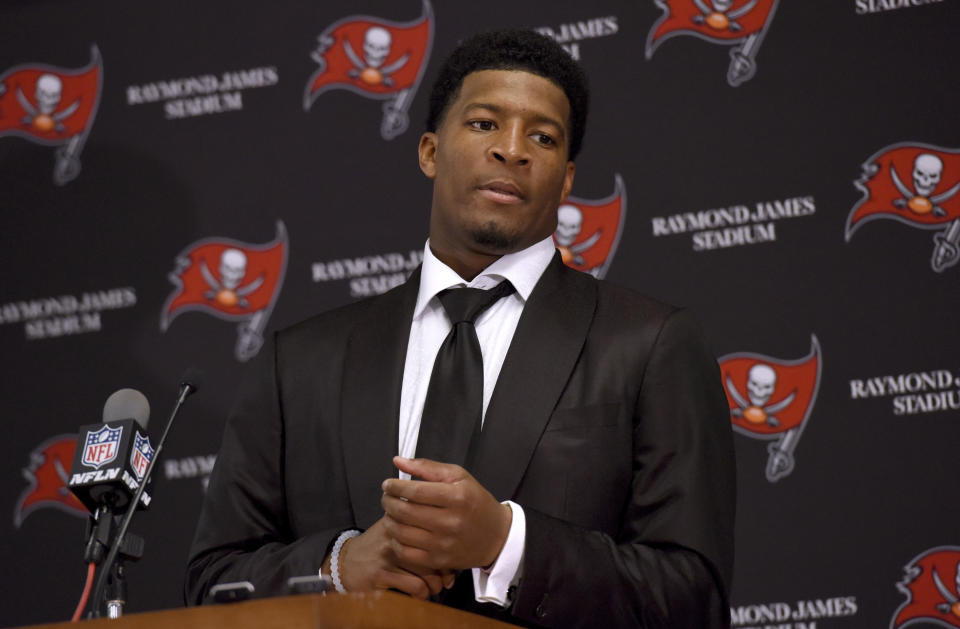Here we go again: NFL ignores its own rule in Jameis Winston case
Nearly two years ago, in this same space, I wrote that the NFL and most of its member clubs do not care about domestic violence.
At the time, it was for the jaw-droppingly-light, one-game suspension the league gave New York Giants kicker Josh Brown despite a lengthy history of Brown’s mental, emotional and physical abuse of his then-wife, Molly.
The league had instituted and trumpeted its own supposedly get-tough policy against domestic abuse in the wake of the intense criticism it took for its handling of the Ray Rice, Greg Hardy and Adrian Peterson cases. It was a six-game minimum suspension from now on, the NFL crowed, even if someone wasn’t convicted in a court of law.

Brown was the test case, the first opportunity the league had to show that it was serious; that it had learned from its prior mistakes in handling such cases, and at minimum, that its new approach was real and not just public relations window dressing.
It failed. Miserably.
To compensate – because the only action NFL honchos know when it comes to such issues is reaction – Dallas Cowboys running back Ezekiel Elliott was given a six-game suspension last year, even when the league’s own investigator said the accuser wasn’t credible.
Elliott isn’t exactly a choirboy – he’s what I’d call a knucklehead – but from what we’ve seen, the league decided to use the rising star as an example, even though his situation, unlike Brown’s, was far from cut-and-dried.
So here we are again, with one of the NFL’s better-known players, Tampa Bay quarterback Jameis Winston, accused of sexually assaulting an Uber driver in Arizona in 2016. Despite a substantial history of troubling behavior at Florida State, including two sexual assault accusations, the Buccaneers held their noses and chose Winston No. 1 overall in 2015.
It was thought Winston had stayed out of trouble, but less than a year after he was drafted, Winston was involved in an incident with a female Uber driver, who was identified as Kate in a BuzzFeed story. Kate did not go to police, but reported the incident to Uber immediately, and phone and text records give validity to her claim.
Kate said she was hailed to a location in Scottsdale, Arizona around 2 a.m. on March 13, 2016. When she arrived at the pickup spot, her passenger was Winston, whom she said began behaving poorly almost immediately, shouting homophobic slurs at pedestrians, then asking Kate to take him for food.
It was while they were in a drive-thru line that Kate says Winston “reached over and he just grabbed my crotch,” and that he kept his hand there for three to five seconds. He removed it after she looked at him in shock and said, “what’s up with that?” She told BuzzFeed she “completely froze” when Winston touched her, and described him as physically imposing.
When news of the NFL’s investigation into the incident became public via the BuzzFeed story, Winston posted a statement on Facebook saying Kate was “confused” and that he was “certain” he didn’t make inappropriate conduct.
This week, however, after Winston accepted what’s essentially a plea deal with the NFL, he blamed his actions on being drunk, which is nothing more than a weak excuse.
In a news release on Thursday announcing Winston’s punishment, the NFL said its investigation found Kate’s account was “consistent and credible” and handed him a three-game suspension.
And now we’re back to that familiar question: What does it take for the NFL to follow its own rule on punishment when it comes to such situations?
The one time commissioner Roger Goodell handed down six games since the institution of the alleged get-tough stance, in the Elliott case, it wasn’t a credible accusation.
In the cases where there was ample evidence of wrongdoing, with Brown and Winston, the punishment wasn’t close to the league’s own guideline.
[Yahoo Fantasy Football leagues are open: Sign up now for free]
Does this make sense to anyone else?
It’s hard trying to make rhyme or reason of many things the NFL has done over the past few years, but its kangaroo court might be most confusing of all. Was Brown given such a light sentence because the league stupidly thought no one would ask questions and find public records on what led to his suspension? Because he was “just” a kicker?
Was Elliott targeted because of his quick success with the NFL’s most high-profile franchise?
Winston so far hasn’t been anything special as a quarterback, but he will always carry the celebrity and visibility of being the top draft pick and playing the highest-profile position in sports. So is the NFL playing a game of degrees, as in grabbing someone between the legs isn’t as bad as forcible rape?
Or even worse, did Winston agree to a compromise, which kept the full scope of his wrongdoing under wraps because there’s more than what’s been written?
And if you’re Winston and his representatives and the Bucs, are you even taking it seriously when the league says the quarterback can be banned if he violates the personal conduct policy again?
For a league that seems to care about two things: money and optics, the NFL continues to make itself look terrible, particularly in the eyes of female fans, when it comes to handling domestic violence and sexual assault issues.
More from Yahoo Sports:
• Chris Mannix: LeBron James’ decision will be bigger circus than previous dramas
• Tiger Woods surges into contention at Quicken Loans tournament
• World Cup: Power ranking teams Nos. 1-16
• Eric Adelson: Bucs shouldn’t hand back Jameis Winston his starting job


